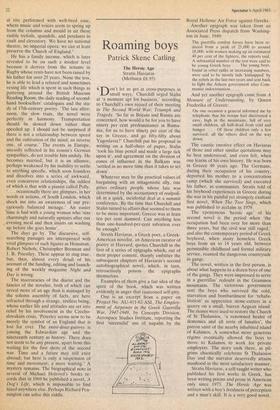Patrick Skene Catling
The Heroic Age Stratis Haviaras (Methuen £8.95)
4Don't let us get at cross-purposes in small ways,' Churchill urged Stalin at 'a moment apt for business,' according to Churchill's own record of their meeting in The Second World War: Triumph and Tragedy. `So far as Britain and Russia are concerned, how would it be for you to have ninety per cent predominance in Ruma- nia, for us to have ninety per cent of the say in Greece, and go fifty-fifty about Yugoslavia?' Churchill put his proposal in writing on a half-sheet of paper, Stalin `took his blue pencil and made a large tick upon it', and agreement on the division of zones of influence in the Balkans was 'settled in no more time than it takes to set down'.
Whatever may be the practical values of bargaining with an antagonistic ally, one pities ordinary people whose fate was determined by the accountancy of realpoli- tik in a quick, incidental deal at a summit conference. By the time that Churchill and Stalin turned to affairs that seemed to them to be more important, Greece was at least ten per cent damned. Can anything less than one-hundred-per-cent salvation ever be enough?
Stratis Haviaras, a Greek poet, a Greek- American novelist, an American curator of poetry at Harvard, quotes Churchill in the first of a series of epigraphs which, out of their proper context, sharply embitter the subsequent chapters of Haviaras's second autobiographical novel, which, in turn, retroactively poison the epigraphs themselves.
Examples of them give a fair idea of the spirit of the book, which was written evidently in anger that cauterised self-pity.
One is an excerpt from a paper on Project No. AU-411-62-ASI, The Employ- ment of Airpower in the Greek Guerrilla War, 1947-1949, by Concepts Division, Aerospace Studies Institute, reporting the first 'successful' use of napalm by the Royal Hellenic Air Force against Greeks. Another epigraph was taken from an Associated Press dispatch from Washing- ton in June, 1949:
Roamingboys The guerrilla combat forces have been re
duced from a peak of 25,0(k) to around 18.(k)0, with women making up an estimated 40 per cent of the fighters, the reports said.
A substantial number of the rest were said to he young Greek boys . . . The young boys, found in rebel ranks in increasing numbers, were said to he mostly lads 'kidnapped' by the rebels in the last two years and sent back to fight the Athens government after Com- munist indoctrination. . . .
And yet another epigraph came from A Measure of Understanding, by Queen Frederika of Greece:
On one occasion a general informed me by telephone that his troops had discovered a cave, high in the mountains, full of very small children, all half-dead from cold and hunger. . . . Of these children only a few survived; all the others died on the way down.
The caustic emotive effect on Haviaras of those and other similar quotations may be best understood, and even felt, when one learns of his own history. He was born in Greece 49 years ago. The Germans, during their occupation of his country, deported his mother to a concentration camp (which she survived) and executed his father, as communists. Stratis told of his boyhood experiences in Greece during the war in his painful yet strangely exultant first novel, When The Tree Sings, which was published to acclaim in 1979.
The eponymous 'heroic age' of his second novel is the period when 'the occupation had been over for more than three years, but the civil war still raged,' and also the contemporary period of Greek boyhood, when many homeless Greek boys from six to 14 years old, between permissible childhood and formal military service, roamed the dangerous countryside in gangs.
The novel, written in the first person, is about what happens to a dozen boys of one of the gangs. They were impressed to serve in a guerrillas' redoubt in the Grammos mountains. The victorious government sent the boys who survived the cold, starvation and bombardment for 'rehabi- litation' as apprentice stone-cutters in a quarry on a small, barren Aegean island. The stones were used to restore the Church
of St Thalassios, 'a renowned healer of demonics and all sorts of lunatics', the patron saint of the nearby inhabited island of Kalamos. A somewhat more generous regime eventually allowed the boys to move to Kalamos to work for private employers. The story ends there, as pil- grims chaotically celebrate St Thalassios Day and the narrator deservedly attains manhood in the most satisfactory manner.
Stratis Haviaras, a self-taught writer who published his first works in Greek, has been writing poems and prose in American only since 1973. The Heroic Age was written with a boy's freshness of perception and a man's skill. It is a very good novel.










































 Previous page
Previous page